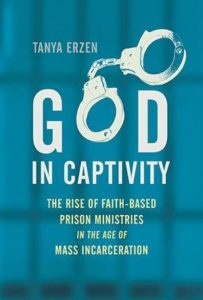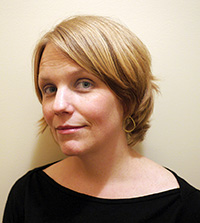The Rise of Faith-Based Prison Ministries in the Age of Mass Incarceration: An Interview with Tanya Erzen

Imagine you wanted to continue your education, but but your only choices were Christian institutions. You love math and want to graduate with a mathematics degree, however your only option is a degree in Christian ministry. You want to become a math teacher but instead you are told you must use your degree to “convert nonbelievers.” Unfortunately, for the men and women living in Louisiana’s prisons this is their reality. The only way for incarcerated individuals in the state to obtain an associate’s degree or bachelor’s a BA is through the Baptist seminary. Faith-based prison ministries and in-prison Bible Colleges are not exclusive to Louisiana. In fact, they are a growing “revolution” in both state and federal prisons.
To learn more about this trend, I had the pleasure of interviewing Tanya Erzen, author of God in Captivity: The Rise of Faith-Based Prison Ministries in the Age of Mass Incarceration.
TheHumanist.com: How did you come to be so interested in religion in America? Were you raised in a religious household?
Tanya Erzen: I wasn’t raised in a religious household. For a short time, my parents were members of a progressive, New England congregational church that focused on the importance of social justice. They were also involved with progressive community politics. I wanted to better understand the political side of religion and the rise of Conservative Christianity, and I knew the only way to do that was to study and understand religion.
TheHumanist.com: How did you become so involved with the prison system? Why did your focus become religion and education within prisons?

Author Tanya Erzen
Erzen: My first experience with the prison system was having a member of my family incarcerated. Then, when I was doing my postdoctoral research at Barnard College. One of my advisors was teaching at Bayview Correctional Facility, a medium-security women’s prison in New York City. I started teaching a class on the history of women and citizenship in the United States. I quickly recognized the importance of offering educational opportunities within prisons. I noticed that the majority of people who were visiting the prisoners were members of religious groups. Just after I had finished teaching at Bayview, Jeb Bush, governor of Florida at the time, announced that he was going to transform all Florida state prisons into faith-based character institutions. I thought about the how this would affect the prisoner’s educational opportunities and decided to dive deeper into the issue.
TheHumanist.com: You’re the executive director of the Freedom Education Project Puget Sound, which provides a rigorous, secular college program to incarcerated women in Washington State and creates pathways to higher education after women are released from prison. Please explain the difference in terms of objectives between the secular college programs and faith-based college programs being offered at state and federal prisons.
Erzen: The Freedom Education Project Puget Sound teaches individuals to think independently and offers them the opportunity, maybe for the first time, to see themselves and their decisions in relation to others and to society as a whole. As I mention in my book, the objective of faith-based ministries within prisons is to convert, pray, teach, and proselytize. These Baptist seminaries offer bachelor’s degrees in Christian ministry with the understanding that these prisoners will then become emissaries of moral rehabilitation and evangelize their peers within all areas of the prison. A seminary is training a person to become something specific, a secular program is giving people in prison the opportunity to figure out what they want to be and study.
TheHumanist.com: Help me better understand: Why are prisons so religious, specifically non-denominational Christian Protestant?
Erzen: These faith-based ministries have stepped in to do programs such as GED preparation courses and mental health services at the prisons that the state often does not have money to provide. This is a win-win situation for both the prison system and the faith-based ministries. The prison system is saving money that they would otherwise have to spend to operate the programs and the faith-based ministries are able to maintain control and continue to proselytize. Another reason comes directly from the faith-based prison ministries’ message of self-transformation and heart change among prisoners. The Christian message explains that if one has an unwavering faith in God’s powers that God will change their heart and transform them into a new person, becoming reborn in other words. The faith-based groups claim a religiously redeemed person is less likely to return to prison because of his or her altered heart. Some prisoners want the certainty and support that faith-based ministries provide. Faith-based ministries create community, contact with the outside world, as well as a purpose and routine for prisoners.
TheHumanist.com: How are these faith-based prison ministries not violating the separation of church and state?
Erzen: Many prison ministries use the term “faith-based prison ministries” to avoid violating the Establishment Clause. By saying that they are a faith-based ministry, as opposed to a Christian prison ministry, they are supposed to allow prisoners of any religion to participate in their programs. Unfortunately, that’s not always the case.
TheHumanist.com: What role, if any, do you think faith-based ministries should play in the prison system?
Erzen: Faith-based ministries can certainly provide resources in the prison system, however there needs to be a diversification of the religious ministries coming into the prisons as well as a diversification in the types of programs that are offered. These faith groups need to be asked: Are you giving the prisoners the support that they need or are you giving them the support you think they need? Faith-based ministries could offer a stronger critique of mass incarceration rather than and do more to help reduce the number of people in prison. Imagine if instead of focusing on converting individuals to Christianity, faith-based groups worked to change sentencing laws in places like Louisiana where Life without the possibility of parole is a common sentence or to end life sentences for juveniles and solitary confinement. There are many issues that they could address.
TheHumanist.com: Have you seen any good humanist or otherwise secular ethical alternatives to Christian ministries in prisons?
Erzen: The alternatives I have seen are reading groups in prison that cover a wide variety of topics and college programs around the country that are promoting the liberal arts in prison.
